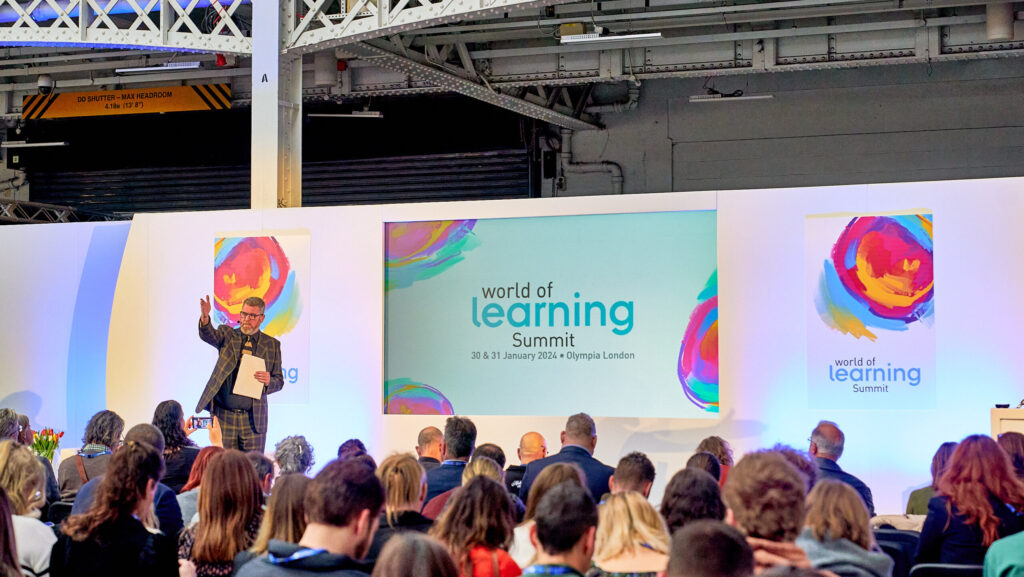Last week, I was privileged to chair the World of Learning Summit at Olympia. It was – as ever – an event in which people shared their challenges, experiences and insights with their peers. There was a positive atmosphere of L&D folks coming together to learn not just from assembled experts on the stage but from each other.
With such a collegiate and collaborative environment, any attempt to provide a blow-by-blow summary is bound to disappoint. A rather dull list of who spoke about what would do a disservice to both the contributions that were made and the spirit of the event.
But there were three themes which represent my take on the event.
Data
For some time, the L&D world has been told we need data analysts (and data to analyse) for it will revolutionise what we do. However, the outcome has been a little underwhelming in many cases.
In some situations, we have made the cardinal mistake of according importance to things we can measure, rather than measuring the things which matter. We have measured engagement as though digital consumption is somehow better than counting bums on seats.
It isn’t!
So what did we learn?
What we learned at the World of Learning Summit was that some organisations have got a handle on informed decision-making. By looking at individual and team performance, the organisations have been able to address challenges by building the skills they need and retaining the staff that will be hardest to replace.
In each case, the data gathered about both (a) top performers and (b) skills gaps has enabled people to use the first to address the second. Rather than the scattergun approach of designing/buying courses to address perceived or imagined gaps in capability, these organisations are increasing both efficiency and effectiveness.
What’s more, because they have created a clear benchmark of “where are we now?” – monitoring change, flexing the strategy and demonstrating value and impact is much more feasible.
Another good thing?
These were not mega corps with tens of thousands of staff and budgets with which to employ a phalanx of consultants. They were more modest in size and more imaginative in their homegrown execution of data-driven strategies.
AI
Carrying on the data theme but viewing it through a different lens, Generative AI was also one of the significant components of the event. Again, we have progressed and moved on.
Whereas in previous events the focus was on “What is this thing called Generative AI?” and “How do I use it to develop more content?”, this time the focus was on more imaginative use cases and experimentation.
Data is pretty important to enable AI to function and enabling Generative AI tools to ingest your data is now much more doable. But which data? To do what? And how do we ensure we are using that data ethically?
The focus
In those sessions which had AI in their title, or those which simply acknowledged it was an important addition to the conversation, the focus was on thinking beyond quick content creation or simply doing a bit more of what we do already.
Conference delegates were challenged to think about what this powerful tech could achieve and where it could take the role of L&D in organisations. We were introduced to tools beyond Chat GPT and encouraged to think of Generative AI as a technology to solve problems rather than a series of products to purchase.
I would be surprised if many left Olympia without enthusiasm to learn more, to experiment and to work out how they could do new, interesting and exciting things with the assistance of Generative AI.
It is not uncommon to experience L&D gatherings as more of a spiritual journey
People
This may seem a little obvious. A conference about learning had ‘people’ as one of its themes? You don’t say!
Well, it has not always been the case. In some conferences, the focus seems to be exclusively on shiny new tech. In others, once you get through the buzzword bingo, and the smoke and mirrors, there’s not a lot left.
It is not uncommon to experience L&D gatherings as more of a spiritual journey than a scientific one. If what we are doing is not working, it must be because our faith is weak. If we clap our hands and say we believe, then it will be true.
This time the focus on people ran through each session like letters through a stick of seaside rock.
The sessions weren’t necessarily about creating psychological safety for our colleagues, but this consideration was echoed again and again. Not in a fog of kind words and imprecision, but as a scientifically defined set of circumstances which we can foster and create through our, specific actions.
Sessions with a point
Whether the session was about leadership, learning agility, personalisation or managing change, the requirement to consult with our people was central.
The sessions provided:
- practical guidance about building initiatives with people;
- about how best to partner with teams;
- and about how to make performance improvement a key role – and a key concern – for everyone.
It was particularly evident in a session about dealing with crisis – organised on the exhibition floor and therefore not restricted to conference delegates.
It was central when real experiences were shared of creating an inclusive work environment for those who are neurodiverse.
Some ‘relied on statistics like a drunken person relies on lamp-posts’
And to take away
Of course, people should be at the heart of what we do. It was great to be part of a conference where practical, pragmatic insights about how to make this so, were not only included but expected by those in attendance.
And before you ask, yes, these insights were supported by data. For sure (to paraphrase Andrew Lang) some ‘relied on statistics like a drunken person relies on lamp-posts – for support and not illumination.’
But for the most part robust, real, and reliable data evidenced significant, positive change where people were elevated to the centre rather than consigned to the periphery of the after-thought.
A great event. And one which I look forward to chairing again when World of Learning returns to the NEC in Birmingham in October 2024.
See you there!








